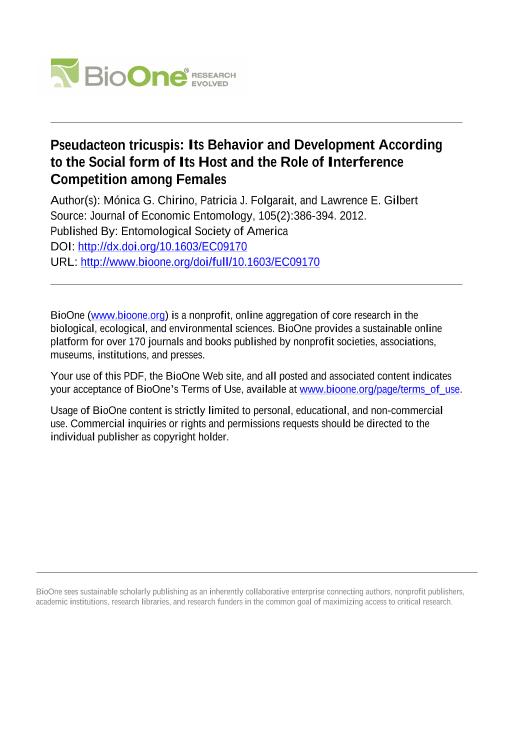Artículo
Pseudacteon tricuspis: Its behavior and development according to the social form of its host and the role of interference competition among females
Fecha de publicación:
04/2012
Editorial:
Entomological Society of America
Revista:
Journal of Economic Entomology
ISSN:
0022-0493
Idioma:
Inglés
Tipo de recurso:
Artículo publicado
Clasificación temática:
Resumen
We studied how the behavior and performance of Pseudacteon tricuspis Borgmeier varies with the social form of its host Solenopsis invicta Buren, in its native range in Argentina where monogyne colonies are more abundant than polygynes (≈75 vs. 25%). Female, P. tricuspis took 44% less time (50 vs. 89 s) to attack monogyne than polygyne ants, but oviposition attempts were similar (23 vs. 18 attacks). The presence of the parasitoid affected the average size of foragers on the trail, with the proportion of minor workers increasing on both social forms. In the laboratory, P. tricuspis selected similar host sizes, although pupal survival was 25% higher on monogynes than on polygynes. Developmental times of both genders were similar (3335 d), although larger females emerged from bigger hosts. The sex ratio of P. tricuspis was more male biased when exploiting polygyne ants. Intraspecific competition significantly affected parasitoid reproductive success, being significantly higher for a solitary female than when three females were present, although the size of workers selected did not vary. The male:female ratio also changed, being 1:1 without competition but 2:1 with competition. We demonstrated for the first time the consequences of interference competition among P. tricuspis females, a common behavior observed in others parasitoids. We discuss why P. tricuspis sex ratios are always biased toward males in both social forms and suggest that similar studies of interference competition within and between already naturalized Pseudacteon species in the United States could help predict establishment patterns.
Archivos asociados
Licencia
Identificadores
Colecciones
Articulos(SEDE CENTRAL)
Articulos de SEDE CENTRAL
Articulos de SEDE CENTRAL
Citación
Chirino, Monica Gabriela; Folgarait, Patricia Julia; Gilbert, Lawrence E.; Pseudacteon tricuspis: Its behavior and development according to the social form of its host and the role of interference competition among females; Entomological Society of America; Journal of Economic Entomology; 105; 2; 4-2012; 386-394
Compartir
Altmétricas




